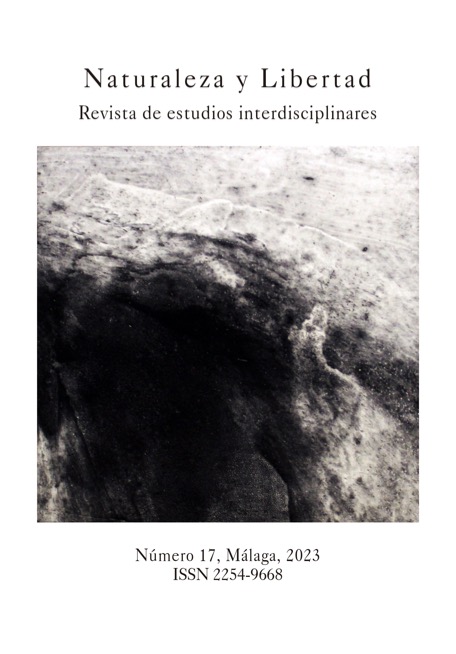Animales políticos humanos y no humanos: la "biología metafísica" de Aristóteles como base de la animalidad política
DOI:
https://doi.org/10.24310/NATyLIB.2023.vi17.16505Palabras clave:
political animal, Aristotle, politics, nature, ergon, non-human animalResumen
En uno de los pasajes más famosos de la Política, Aristóteles afirma que "el hombre es un animal político" (zoon politikòn) (Pol. I.2 1253a4). Estafór- mula, que ha dado lugar a innumerables interpretaciones, sigue siendo objeto de controversia. En este artículo se presentarán y evaluaránalgunas de las principales estrategias interpretativas. En la primera sección se esbozarán las tres principales: la exclusiva, la inclusiva y unamás amplia y zoológica (o lo que po- dría denominarse la interpretación del "ergon común"). El resto del documento apoyará unainterpretación biológica de zoon politikòn, que pone un énfasis cen- tral en el tratamiento literal de Aristóteles (en contraposición a metafórico)de algunos animales no humanos como políticos en algunas de sus obras biológicas, así como en la Política. Las categorizaciones de animales políticos humanos y no humanos en Historia de los animales sugieren una compleja imagen no dualista, que implica la posibilidad de que algunos humanos se conviertan en no políticos y algunos animales sean plenamente políticos. A la vez que proporcionamos una interpretaciónbiológica literal de la animalidad política, también será necesario especificar que la biología de Aristóteles es una "biología metafísica", comodijo MacIntyre (2007). No es un tipo de biología moderna, evolucionista, y se fun-
Descargas
Métricas
Citas
Aristotle (2002) Historia Animalium. Ed. and trans. by David M. Balme. Cambridge: Cambridge Press
Aristotle, (2009) Nicomachean Ethics. Trans. by W. D. Ross, Introduction and notes by Lesley Brown. Oxford: Oxford University Press
Aristotle (2009) Politics. Trans by Ernest Barker, Introduction and notes by R. F. Stalley. Oxford: Oxford University Press.
Abbate, C. E. (2016) “"Higher" and "Lower" Political Animals: A Critical Analysis of Aristotle's Account of the Political Animal” Journal of Animal Ethics, 6(1), 54-66. University of Illinois Press in partnership with the Ferrater Mora Oxford Centre for Animal Ethics. https://www.jstor.org/stable/10.5406/janimalethics.6.1.0054
Achtenberg, D. (1992) “On the metaphysical presuppositions of Aristotle's Nicomachean Ethics” The Journal of Value Inquiry, 26: 317-340. Kluwer Academic Publishers. https://doi.org/10.1007/BF00140935
Arnhart, L. (1994) “The Darwinian Biology of Aristotle's Political Animals”. American Journal of Political Science 38 (2), 464-485.
Baker, S. (2015). The Concept of Ergon: Towards an Achievement Interpretation of Aristotle’s ‘Function Argument’. In Oxford Studies in Ancient Philosophy, Volume 48. Oxford University Press.
Balme, D..M. (1962). Development of Biology in Aristotle and Theophrastus: Theory of Spontaneous Generation, Phronesis, 7(1-2), 91-104. https://doi.org/10.1163/156852862X00052
Balme, D. M. (1980). “Aristotle’s Biology was not Essentialist”. Archiv für Geschichte der Philosophie, 62(1), 1-12. https://doi.org/10.1515/agph.1980.62.1.1
Bennington, G. (2011) “Geoffrey Bennington. Political Animals. 2011” European Graduate School Video Lectures https://www.youtube.com/watch?v=ZxY3iNeQ0zA
Cooper, J. (1988) “Metaphysics in Aristotle's Embryology”. Proceedings of the Cambridge Philological Society, 34, 14-41. doi:10.1017/S0068673500005022
Depew, D. J. (1995) “Humans and Other Political Animals in Aristotle's "History of Animals"”. Phronesis 40 (2), 156-181. Brill. Stable URL: https://www.jstor.org/stable/4182496
Keyt, D. (1987) “Three Fundamental Theorems in Aristotle's "Politics"” Phronesis, 32(1), 54-79. Brill. http://www.jstor.org/stable/4182267
Labarrière, J. (2016). “Que fait la nature en politique selon Aristote ? Retour sur la définition de l’homme comme « animal politique par nature »”. Revue de philosophie ancienne, 34(2), 141-160. doi:10.3917/rpha.342.0141.
Lennox, J. G. (1980) “Aristotle on Genera, Species, and “the More and the Less”” Journal of the History of Biology, 13 (2) (Fall 1980), pp. 321- 346
Lennox, J.G. (2012). “Aristotle's Biology and Aristotle's Philosophy” in A Companion to Ancient Philosophy (eds M.L. Gill and P. Pellegrin). doi:10.1002/9781444305845.ch16
Leroi, A. (2020) “Aristotle's Biology — Armand Leroi / Serious Science” Serious Science. https://www.youtube.com/watch?v=frVUd4V5ZTk
MacIntyre, A. (2007) After Virtue: A Study in Moral Theory, Third Edition. University of Notre Dame Press
Mayhew, R. (1997) “Part and Whole in Aristotle‘s Political Philosophy”. The Journal of Ethics 1, 325–340. https://doi.org/10.1023/A:1009743012461
Miller Jr., F. D. (1989). “Aristotle's Political Naturalism” Apeiron, 22(4), 195-218. doi: https://doi.org/10.1515/APEIRON.1989.22.4.195
Mulgan, R. G. (1974) “Aristotle's Doctrine That Man Is a Political Animal”. Hermes, 102. H. 3, 438-445. Franz Steiner Verlag, https://www.jstor.org/stable/4475868
O’Rourke, F. (2012) “Aristotle’s Political Anthropology” in Politics of Practical Reasoning Integrating Action, Discourse and Argument, eds. Ricca Edmondson and Karlheinz Hülser, 17-38. Plymouth: Lexington Books
Schofield, M. (2006) “Aristotle’s Political Ethics” in The Blackwell Guide to Aristotle’s Nicomachean Ethics, ed. Kraut, R., 305-322. Oxford: Blackwell Publishing Ltd.
Descargas
Publicado
Cómo citar
Número
Sección
Licencia
Derechos de autor 2023 Naturaleza y Libertad. Revista de Estudios Interdisciplinares

Esta obra está bajo una licencia internacional Creative Commons Atribución-NoComercial-CompartirIgual 4.0.
Aquellos autores/as que tengan publicaciones con esta revista, aceptan los términos siguientes:
1. La información de derechos de autor y licencias se describe claramente en el sitio web de la revista: todo el contenido publicado en Naturaleza y Libertad es de acceso abierto sin límite y está sujeto a la licencia Attribution-NonCommercial-ShareAlike 4.0 International (CC BY-NC-SA 4.0). El texto completo se puede consultar en https://creativecommons.org/licenses/by-nc-sa/4.0/
2. Es responsabilidad de los autores obtener los permisos necesarios para las imágenes que están sujetas a derechos de autor. Los autores cuyas contribuciones sean aceptadas para su publicación en esta revista conservarán el derecho no exclusivo de utilizar sus contribuciones con fines académicos, de investigación y educativos, incluido el autoarchivo o el depósito en repositorios de acceso abierto de cualquier tipo. La edición electrónica de esta revista está editada por la Editorial de la Universidad de Málaga (Uma Editorial), siendo necesario citar el origen en cualquier reproducción parcial o total.
3. Esta revista permite e incentiva a los autores a publicar artículos en sus sitios web personales o en repositorios institucionales, tanto antes como después de su publicación en esta revista, siempre que proporcionen información bibliográfica que acredite, en su caso, su publicación en la misma.
4. En ningún caso se publicarán artículos anónimos.





18.png)













